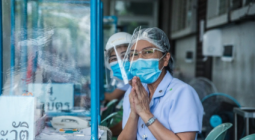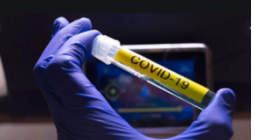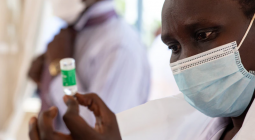Wealthy countries 'are buying up far more COVID-19 vaccines than they need' — and that's bad news for the end of the pandemic
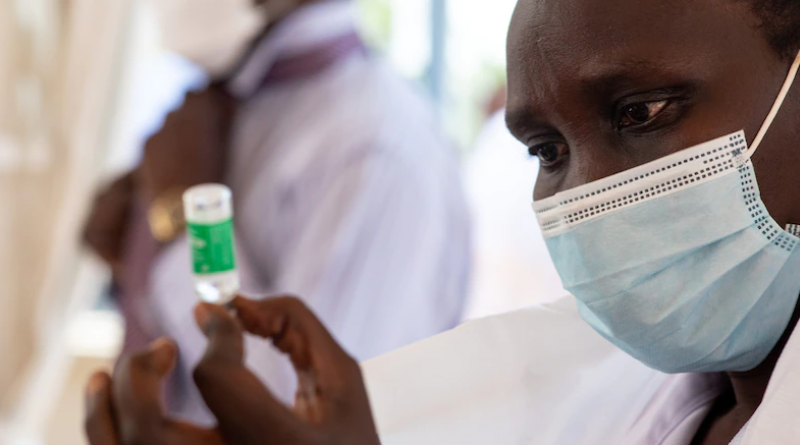
Getting COVID-19 vaccine doses into arms is cracking along in some countries, but in the poorest, it's barely started at all.
And if vaccination rates in low- and middle-income nations are not ramped up soon, experts estimate it could be 2024 by the time the COVID-19 pandemic is brought under control worldwide.
This is despite the international COVID-19 Vaccines Global Access (COVAX) program, which aims to get 2 billion doses of vaccines out to member nations, supplying them at a discounted rate for the 92 poorest countries.
Its motto is "no-one is safe unless everyone is safe".
COVAX was set up in April last year by the World Health Organization, the Coalition for Epidemic Preparedness and Gavi, the Vaccine Alliance. In the year since, 190 countries including Australia have signed up.
Some countries also announced separate commitments to donate vaccines to others.
For instance, in October, the Australian government pledged $500 million over three years to supply vaccines to South East Asian and Pacific neighbours.
But wealthy countries are scuppering COVAX, says La Trobe University's Deborah Gleeson, who researches how international trade agreements affect access to medicines.
These countries should — and can — step up to help end the COVID-19 pandemic, she says.
And that includes Australia.
"I think the COVAX program was a really good idea in terms of a mechanism for purchasing and distributing vaccines in an equitable way around the world," Dr Gleeson said.
"But it's been undermined by the way wealthy countries have negotiated deals with pharmaceutical companies and made a global grab for vaccines, and that has meant there's been really limited supply for COVAX to use to meet the needs of low-income countries."
Luckily, there is a way to manufacture billions more vaccine doses quickly and cheaply, and deliver them to people who need them.
And something like it's been done before.
How does COVAX work?
COVAX's central idea is member countries put money into the program and, in return, gain access to a pool of 2 billion doses of COVID-19 vaccine in 2021.
As 2 billion doses will not be enough to attain herd immunity around the world, the aim is to vaccinate the most vulnerable and highest risk people.
COVAX is the best way to coordinate the distribution of COVID-19 vaccines to people who need them, says Mike Toole, an epidemiologist at the Burnet Institute.
The first shipments were delivered to Ghana in February.
But while COVAX had raised $US6 billion ($7.9 billion) as of February, it needs at least another $US2 billion ($2.6 billion) to meet its 2021 target.
However, even if it manages to raise those extra funds, there's still a major spanner in the works: the market problem.
High-income countries 'hogging the vaccine market'
Blocking supply to COVAX are high-income countries, including the US, UK and Australia, which struck pre-emptive deals with vaccine manufacturers that, all up, are large enough to vaccinate their population many times over.
Casting your purchasing net wide makes sense, if you can afford it. Not all vaccine candidates would pass clinical trials.
"By November 2020, almost 7.5 billion vaccine doses were pre-purchased," Dr Gleeson said.
Even taking into account two-dose vaccines, Australia's 124 million doses on order (not counting those supplied through COVAX) could fully vaccinate the population 2.5 times.
We're not even the worst offenders. Canada ordered 338 million doses, enough to vaccinate every Canadian five times.
This over-ordering, also called vaccine nationalism, means there are less vaccines available for COVAX to buy.
Some countries, such as the UK, promised to distribute surplus vaccine stock, Professor Toole said.
"We [Australia] need to get a move on to get a good number of people vaccinated before the winter, then should start sharing our reserves with our neighbours."
Neighbours such as Papua New Guinea, which is currently riding a massive surge in COVID-19 cases.
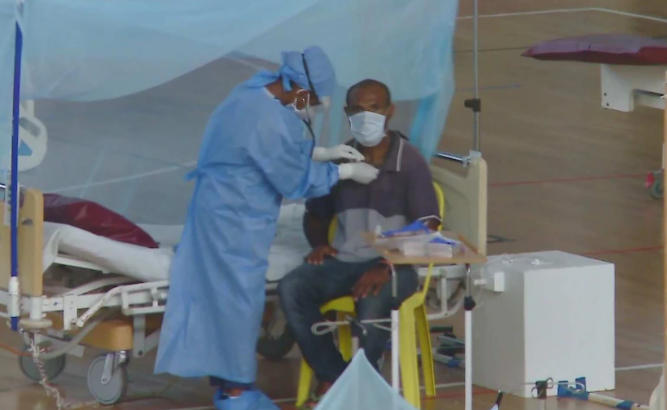
In response, the Australian government this week flew 8,000 locally made AstraZeneca vaccine doses to Port Moresby to vaccinate healthcare workers.
It also urged the EU to release 1 million of the 3.8 million doses Australia pre-ordered from AstraZeneca's European manufacturing facilities, and divert them to the Pacific Island nation.
But that's easier said than done. In early March, Italy blocked a shipment of 250,000 doses bound for Australia.
"If we can't get that million doses from the EU to PNG, we should start sending up a million doses from [CSL's manufacturing facility in] Melbourne to PNG," Professor Toole said.
There is a solution, but not everyone's on board
For Dr Gleeson and Professor Toole, the best way to alleviate this supply shortage is that intellectual property rights for COVID-19 medical products be waived for the duration of the pandemic, a proposal put forward by India and South Africa to the World Trade Organization (WTO) in October last year.
The WTO regulates intellectual property rights at the global level through the trade-related aspects of intellectual property rights, or TRIPS, agreement.
A waiver would let countries make vaccines locally without having to negotiate a voluntary agreement with the drug companies on an ad hoc basis.
"Intellectual property rights get in the way of ramping up [medicine] production really quickly, because certain pharmaceutical companies hold the exclusive rights to make and sell products or control who else can make and sell them," Dr Gleeson said.
Since October, 118 of the WTO's 164 member nations have supported the TRIPS waiver.
But the proposal is being opposed by wealthy countries, Dr Gleeson added.
"The US, the EU, the UK are countries that have big pharmaceutical industries and want to protect the profitability of those industries.
Freeing up intellectual property isn't worth much unless it's shared and made readily available for countries to use.
For that, there's also an existing platform — the COVID-19 technology access pool, or C-TAP — set up in May last year by the WHO, for this exact purpose.
C-TAP is intended to not only expedite COVID drug development, but also "accelerate the scale-up of manufacturing and the removal of barriers to access in order to make products available globally".
Nearly a year on, it's not being used.
"Companies haven't been contributing their intellectual property to that pool, and governments haven't taken the steps that they would need to make that happen," Dr Gleeson said.
If intellectual property is freely shared, even just temporarily over the next year or so, low- and middle-income countries could start manufacturing billions of vaccines.
"Apart from India, you have Vietnam, Bangladesh, Thailand, Indonesia; all these countries in our region can produce vaccines.
"Cuba, for instance, can produce 100 million vaccine doses a year."
They did it during the HIV/AIDS crisis
We know freeing up intellectual property to manufacture medicines can make them more available and affordable, because it's happened before.
During the HIV/AIDS crisis, African nations simply could not afford antiretroviral drugs until they negotiated with the WTO to allow local drug manufacturers to produce generic, and much cheaper, versions of antiretrovirals.
For instance, an Africa-produced generic version of the antiretroviral drug stavudine, also known as d4T, costs 34 times less than the Bristol Myers Squibb-branded drug.
Dr Gleeson is disappointed to see wealthy countries obstructing these processes for COVID-19, while arguing that existing agreements will be enough to solve the problem.
"If we don't take immediate action to fix the balance, it'll be 2023 or 2024 before vaccination brings the pandemic under control at the global level," she warned.
"And that's a problem for all of us, not just for developing countries, because when you have uncontrolled transmission in some parts of the world, there's a much higher risk that variants will emerge that are resistant to the vaccine.
"It's not something that we can ignore. We really need to address this very urgently."
28 March 2021
ABC

